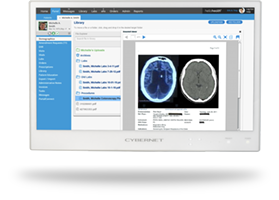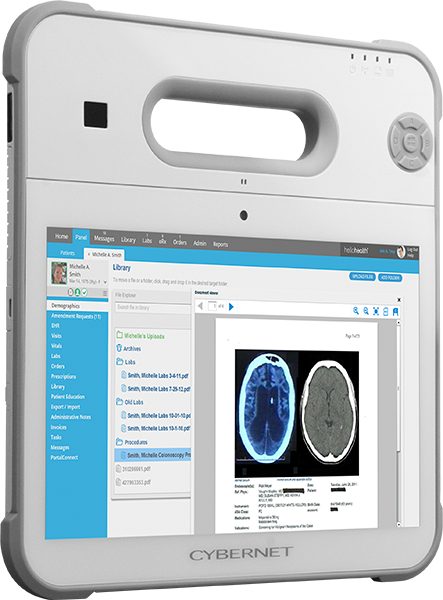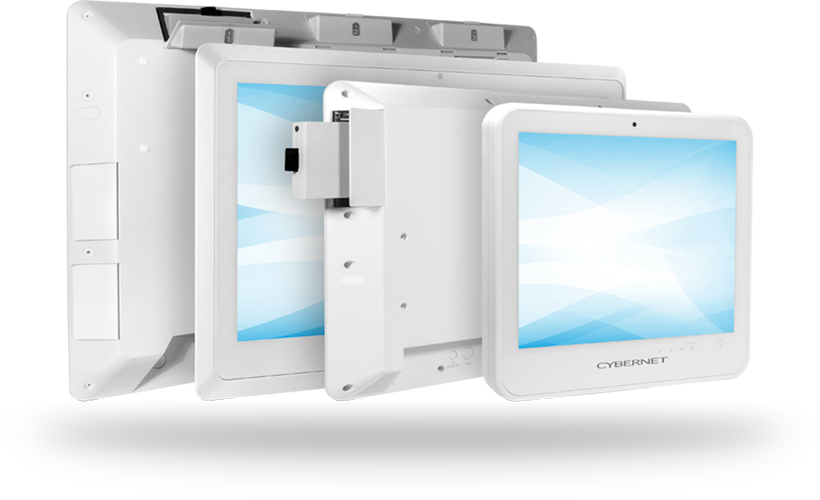In medicine, information saves lives. Patient vitals, like body temperature and blood pressure, determine their current level of distress. Nurses and providers use that information to diagnose and treat their conditions successfully.
The need for information makes electronic health records, which hold a patient's medical history, critical in their treatment. Medical computers are built from the inside out for the healthcare industry, with features that ensure records are available when and where medical staff needs them.
What Is An EHR?
Electronic health records (EHR), also called electronic medical records (EMR), are digital files containing a patient's medical history, such as:
- Allergies
- Diagnoses
- Immunizations
- Lab results
- Medication
Providers diagnose and treat patients partially based on their past and current medical histories. That makes EHRs vital for successful outcomes.
Why Use Medical Computers for EHR?
Conditions at many healthcare facilities are unforgiving to electronics like computers. Hospitals, especially, can be harsh due to constant disinfection and 24/7 operations, among other factors.
The healthcare industry has turned to medical computers as the best devices for EHR systems. They have been built from the inside out to handle the industry's conditions. Their advantages over consumer-grade models are numerous.
They protect patients and medical devices. No one wants a computer that could shock a patient or interfere with nearby medical devices. So real medical computers are medical-grade (IEC 60601), having been built, tested, and certified to operate safely around patients and medical devices.
Extreme reliability. Providers cannot afford their computers failing during a patient exam or treatment. The results could be life-threatening. Thus, medical computers are built to be highly reliable. Features like a sealed front bezel and fanless design ensure that providers can bring up patient records without fail.
Protect patient privacy. EHRs contain sensitive patient information, such as social security numbers and credit card details. Laws like the Health Insurance Portability and Accountability Act (HIPAA) aim to protect them from prying eyes. Many medical computers come with specialized hardware and software to ensure privacy. (Examples: RFID reader, Imprivata Single Sign-On, etc.).
Long life cycles for hardware and software: Providers do not have the time to learn a computer's latest features every time it's updated or upgraded. Thankfully, many medical computers have long life cycles (5-6 years). This ensures they work as expected, allowing the provider to focus on patient care rather than on where the Start button is.
Configurations for EHR Computers
Providers and other medical staff need to be able to pull up patient's records quickly and update them without hassle or fuss. Two major EHR computer configurations have evolved to aid them.
Desktop PC
Desktop computers come in two main setups: the traditional design, which features a separate tower and monitor, and an all-in-one medical PC, which combines both into a single, compact, and powerful unit. Either one is placed on a desk at a nurses' station or a similar fixed location.
Both make reviewing patient records a breeze thanks to the large screen, keyboard, and mouse. The disadvantage is they are stationary. Medical staff must travel to the nearest one each time to review and update a patient's record. This could take them far from the patient, which may cause them to forget vital information. It's also fatiguing to travel so much, which can lead to burnout among physicians and nurses.
Workstation on Wheels
Hospitals solve the stationary issue using workstation on wheels, or WoWs. The setup places the EHR computer onto a cart. The medical staff then push the WoW to the patient's location and make updates at their bedside.
Hospital WoWs also come in two setups:
Powered carts are designed with an attached rechargeable battery to power the EHR computer. The battery is heavy and tiring for staff to push about.
The battery usually has enough power to last a typical shift (8 - 10 hours). It then needs to be plugged into an outlet to recharge, which can take several hours. The powered cart is immobile during this time, forcing staff to travel to them when updating patient records.
Non-powered carts do not have batteries attached to them. Instead, they power the EHR computer with smaller, rechargeable batteries built into the medical-grade monitor or panel PC. The batteries are "hot-swappable," allowing staff to replace spent batteries with fresh, fully charged ones while the computer is still running.
Thanks to hot-swap batteries, medical staff can effectively access to the EHR on all shifts (24/7). They also don't tire as much since non-powered WoWs weigh less.
Things to Consider When Selecting The Best Computer for EHR
So, what should healthcare IT look for when determining the best computer for their EHR system? They should ask themselves:
- Can the computer run your EHR system? More specifically, what processor does it use? Is there enough memory (RAM) and storage space (hard disk) for your application? Also, check screen sizes; some EHR systems are optimized for specific ones.
- Is it medical grade? As mentioned earlier, true medical-grade PCs are certified to operate safely around patients and nearby medical devices.
- Can it stand up to hospital cleaning? Hospitals are obsessed with cleanliness. Unfortunately, dusting around computers and wiping them down with cleaners can damage their internal components. To prevent this, verify that they are sealed against both with an ingress protection rating of 65 or higher.
- Is it fanless? Another way to protect the computer interior is a fanless cooling system. This assures no dust or liquids get sucked into the machine. The design also increases reliability since it has no moving parts that can break down. Patients get better rest thanks to the design's lack of noise.
- What security features does it have? You'll want to ensure that only authorized staff can access the patient records. The previously mentioned RFID reader and Imprivata Single Sign-On login systems are a solid start. Check if even more advanced security features, like facial recognition, are supported.
- How reliable is the computer? Again, an EHR computer going down at a critical moment can spell disaster for patients. Find out if the computer vendor knows the fail rate of their systems.
- Who actually builds your computers? Many of the above questions can be answered by the computer's maker, its original equipment manufacturer (OEM). Unlike a reseller, an OEM will have the computer's entire specs from design to bill of materials. Their help desk will also be very knowledgeable in rare cases where issues arise with the computer.
Selecting the Best Computer for EHR with Cybernet
Information like EHR plays a key role in a patient's treatment from diagnosis to treatment. Providers and other medical staff rely on their computers to access that information, even under harsh hospital conditions.
If your healthcare group is interested in an EHR medical computer, contact Cybernet Manufacturing. We are highly knowledgeable about the healthcare sector and how our medical panel PCs, medical boxes, and tablets meet the challenges. We will happily go over our medical AI computers if your group is looking for such cutting-edge solutions. And don't worry if you can't find the exact match among our pre-built models. Cybernet is an OEM, and we’re confident we can build whatever medical PC you're looking for.


